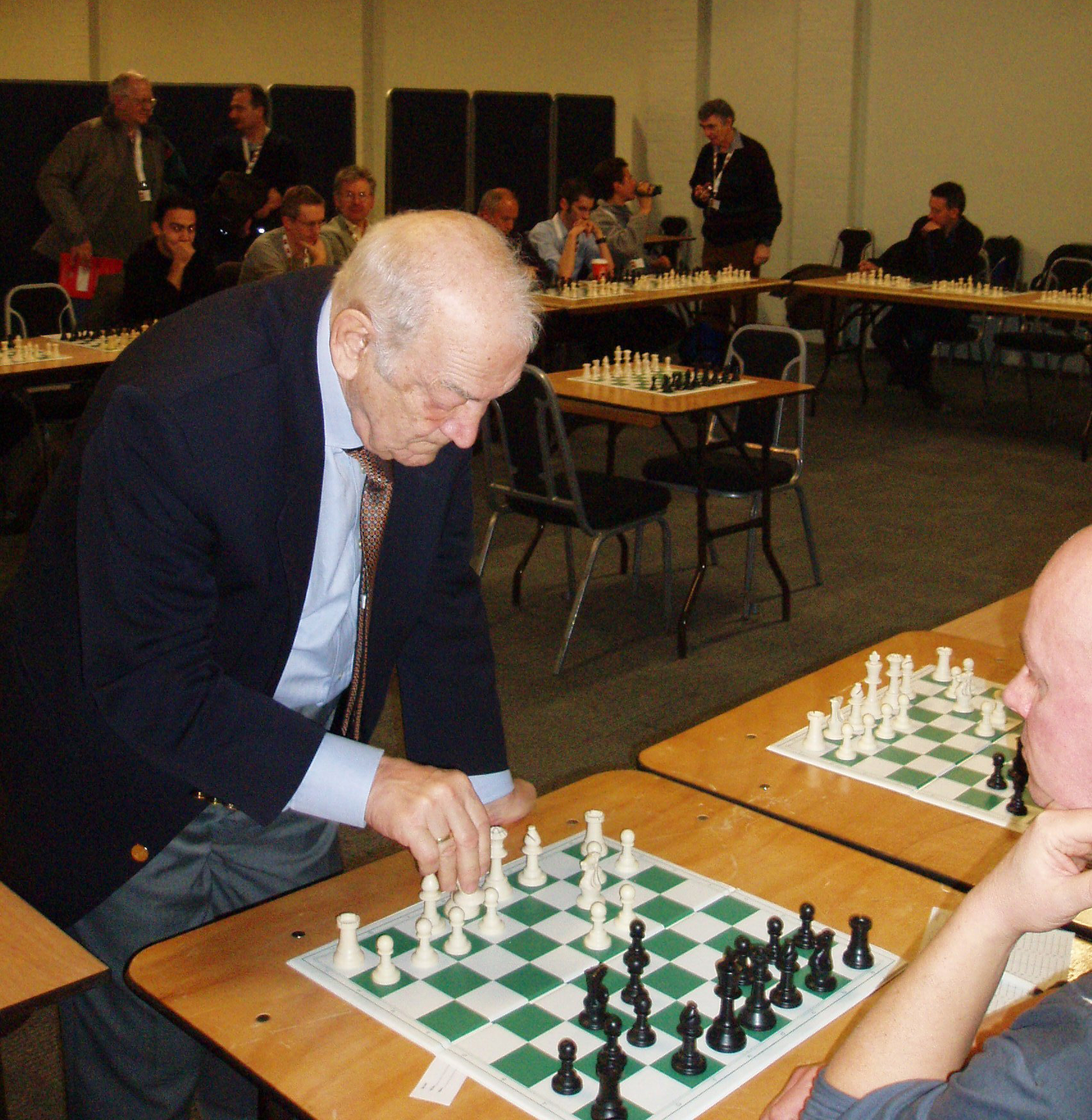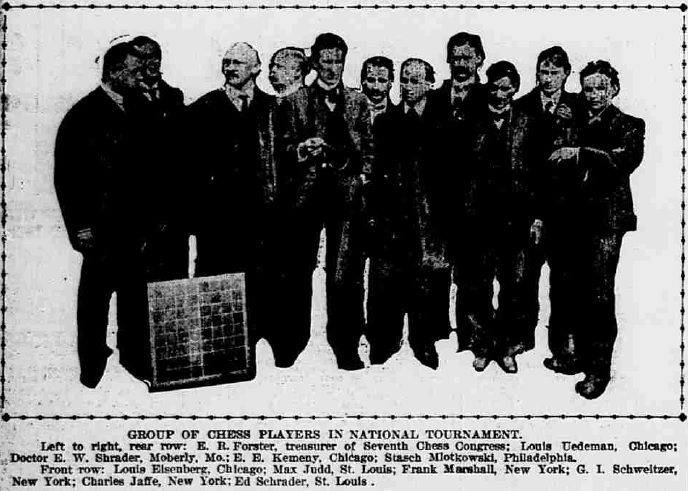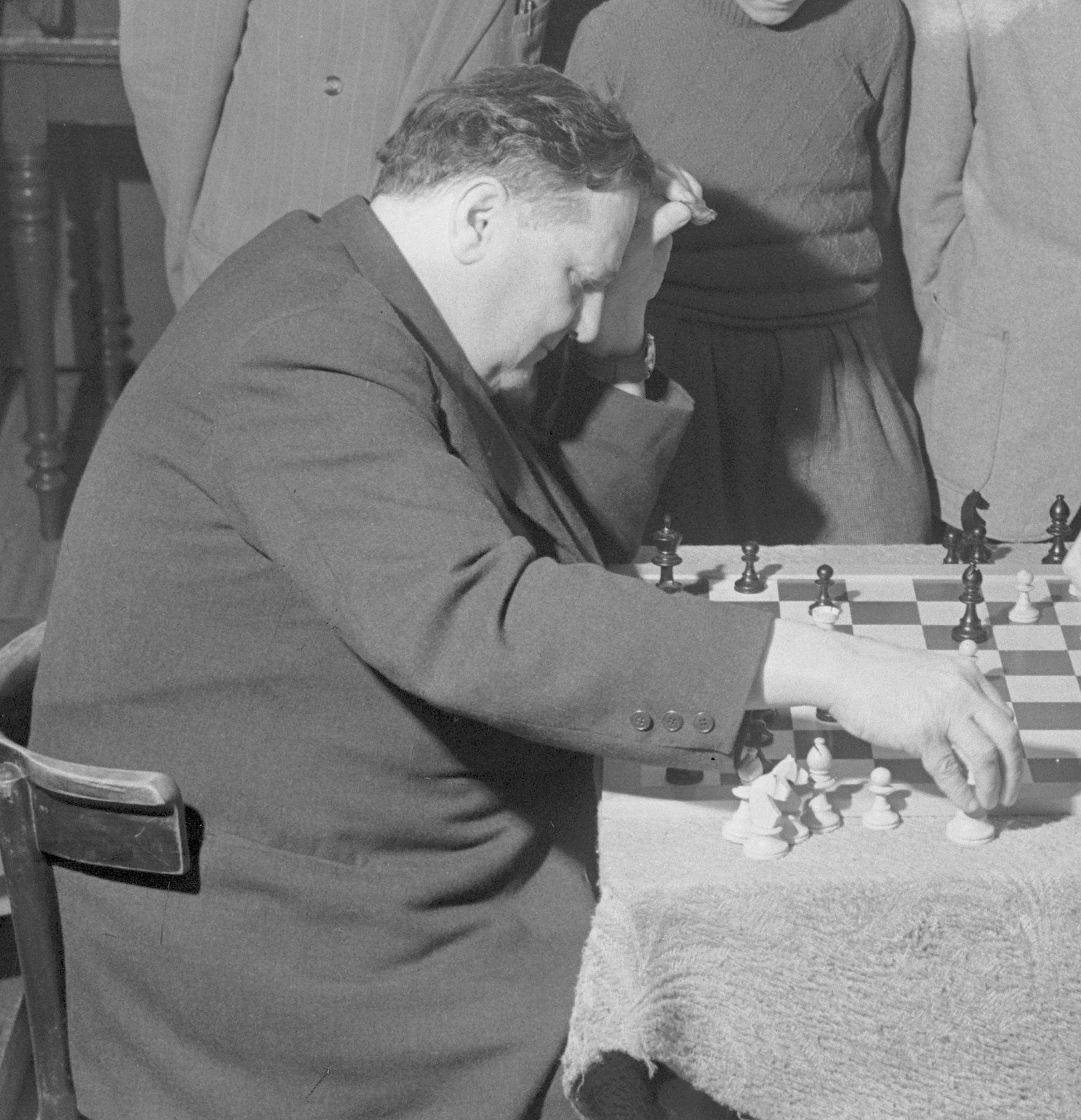|
Otto Löwenborg
(Knut) Otto (Reinhold) Löwenborg (Loewenborg, Loevenborg, Løwenborg, Løvenborg) (2 March 1888 – December 1969) was a Swedish chess master. In January 1912, he won a simultaneous exhibition game against Frank James Marshall in Stockholm. He took 3rd at Stockholm 1913 (Boris Kostić won), took 9th at Jungbunzlau (Mladá Boleslav) 1913 (Karel Opočenský won), tied for 2nd–4th at Copenhagen 1916 (the 9th Nordic Championship, Paul Johner won), took 8th at Stockholm 1916, took 6th at Kristiania 1917 (the 10th Nordic-ch, Gustaf Nyholm won), shared 1st with Anton Olson and won a match against him (3–2) at Stockholm 1917, and finally lost a match for the Swedish Champion title to Nyholm (1–4) at Stockholm 1917. He tied for 7–8th at Göteborg 1918 (Karl Berndtsson Karl Mathias Berndtsson Kullberg (16 March 1892 – 29 September 1943) was a Swedish chess master who was born and died in Göteborg. He won at Copenhagen 1916, and lost a match for the Swedish Chess Champions ... [...More Info...] [...Related Items...] OR: [Wikipedia] [Google] [Baidu] |
Sweden
Sweden, formally the Kingdom of Sweden,The United Nations Group of Experts on Geographical Names states that the country's formal name is the Kingdom of SwedenUNGEGN World Geographical Names, Sweden./ref> is a Nordic country located on the Scandinavian Peninsula in Northern Europe. It borders Norway to the west and north, Finland to the east, and is connected to Denmark in the southwest by a bridgetunnel across the Öresund. At , Sweden is the largest Nordic country, the third-largest country in the European Union, and the fifth-largest country in Europe. The capital and largest city is Stockholm. Sweden has a total population of 10.5 million, and a low population density of , with around 87% of Swedes residing in urban areas in the central and southern half of the country. Sweden has a nature dominated by forests and a large amount of lakes, including some of the largest in Europe. Many long rivers run from the Scandes range through the landscape, primarily ... [...More Info...] [...Related Items...] OR: [Wikipedia] [Google] [Baidu] |
Chess
Chess is a board game for two players, called White and Black, each controlling an army of chess pieces in their color, with the objective to checkmate the opponent's king. It is sometimes called international chess or Western chess to distinguish it from related games, such as xiangqi (Chinese chess) and shogi (Japanese chess). The recorded history of chess goes back at least to the emergence of a similar game, chaturanga, in seventh-century India. The rules of chess as we know them today emerged in Europe at the end of the 15th century, with standardization and universal acceptance by the end of the 19th century. Today, chess is one of the world's most popular games, played by millions of people worldwide. Chess is an abstract strategy game that involves no hidden information and no use of dice or cards. It is played on a chessboard with 64 squares arranged in an eight-by-eight grid. At the start, each player controls sixteen pieces: one king, one queen, two rooks, t ... [...More Info...] [...Related Items...] OR: [Wikipedia] [Google] [Baidu] |
Simultaneous Exhibition
A simultaneous exhibition or simultaneous display is a board game exhibition (commonly chess or Go) in which one player (typically of high rank, such as a grandmaster or dan-level player) plays multiple games at a time with a number of other players. Such an exhibition is often referred to simply as a "simul". Procedure In a regular simul, no chess clocks are used (if they are involved it is called a ''clock simul''). The boards are usually arranged in a large circle or square and the exhibitor walks from board to board in a fixed order. Each individual participant is expected to make a move when the exhibitor arrives at their board. The exhibitor may pause briefly before playing their move, but will typically attempt to avoid lengthy pauses because too many such pauses will cause the exhibition to continue for an extended period. Longer exhibitions increase the risk of fatigue-induced blunders on the part of the exhibitor, especially since the individual participants remainin ... [...More Info...] [...Related Items...] OR: [Wikipedia] [Google] [Baidu] |
Frank James Marshall
Frank James Marshall (August 10, 1877 – November 9, 1944) was the U.S. Chess Champion from 1909 to 1936, and one of the world's strongest chess players in the early part of the 20th century. Chess career Marshall was born in New York City, and lived in Montreal, Quebec, Canada, from age 8 to 19. He began playing chess at the age of 10, and by 1890 (aged 13) was one of the leading players in Montreal. He won the 1904 Cambridge Springs International Chess Congress (scoring 13/15, ahead of World Champion Emanuel Lasker) and the U.S. Congress in 1904, but did not get the national title because the U.S. champion at that time, Harry Nelson Pillsbury, did not compete. In 1906 Pillsbury died and Marshall again refused the championship title until he won it in competition in 1909. In 1907 he played a match against World Champion Emanuel Lasker for the title and lost eight games, winning none and drawing seven. They played their match in New York City, Philadelphia, Washington, ... [...More Info...] [...Related Items...] OR: [Wikipedia] [Google] [Baidu] |
Boris Kostić
Borislav Kostić (24 February 1887 – 3 November 1963) was a Yugoslav chess grandmaster and a popularizer of the game. Life and chess Borislav Kostic was born in Vršac, Kingdom of Hungary, at the time part of Austria-Hungary. His father Dimitrije was a merchant and his mother was Emilija (née: Mandukić). He learned chess around the age of ten and made rapid progress while studying Oriental Trade in Budapest. He also spent time in Vienna, the chess capital of the day, and this enabled him to get the high level practice necessary to take his game to the next level. In 1910 he moved to Cologne and from there, travelled and toured extensively, mainly in the Americas, playing matches against local champions and simultaneous blindfold chess. At New York in 1916, he once played twenty opponents without sight of a board and won nineteen games and drew one, while engaging in polite conversation with opponents and spectators. Kostic played more formal matches against Frank Ma ... [...More Info...] [...Related Items...] OR: [Wikipedia] [Google] [Baidu] |
Karel Opočenský
Karel Opočenský (7 February 1892 – 16 November 1975) was a Czechoslovak chess master. Chess career Opočenský was four-time Czech Champion (1927, 1928, 1938, and 1944). In 1919, he took 2nd, behind František Schubert, in Prague ( Czechoslovak Chess Championship). In 1925, he tied for 3rd–4th in Paris (Alexander Alekhine won). In 1927, he won in Česke Budějovice (CSR-ch). In 1928, he won in Brno (CSR-ch). In 1933, he won at Prague (the 10th Vaclav Kautsky Memorial). In 1935, he took 4th in Bad Nauheim (Efim Bogoljubow won). In 1935, Opočenský took fourth place in Łódź (Savielly Tartakower won). In 1935, he won in Luhačovice. In 1936, he took second place, behind Henryk Friedman, in Vienna. In 1937, he took second, behind Karl Gilg, in Teplice (Teplitz Schönau). In 1938, he won in Nice. In 1938, he tied for first with Hermann in Prague (CSR-ch). Opočenský played for Czechoslovakia four times in the Chess Olympiads. * In 1931, he played at fourth board in 4th C ... [...More Info...] [...Related Items...] OR: [Wikipedia] [Google] [Baidu] |
Nordic Chess Championship
The Nordic Chess Championship (''Nordiska Schackkongressen'') is a biennal chess tournament which determines the champion of the Nordic countries. The first edition took place in Stockholm in 1897. History The winners in the Nordic Championship in 1934 and 1936, Aron Nimzowitsch and Erik Lundin, got the ''Nordiske kongresmestre'' title, as the champion of 1930, Erik Andersen, defended his title with 3–3 against Gideon Ståhlberg at Copenhagen 1934 and lost it by 2½–3½ against Erik Lundin at Copenhagen 1937. Several of the Nordic Championship have been arranged as part of an open tournament, where the best placed player from a Nordic country becomes Nordic champion even if that person did not win the event. For example, the Nordic Champion of 2011, Jon Ludvig Hammer, finished fifth in the Reykjavik Open The Reykjavik Open is an annual chess tournament that takes place in the capital city of Iceland. It was held every two years up to 2008, currently it runs annually. The first ... [...More Info...] [...Related Items...] OR: [Wikipedia] [Google] [Baidu] |
Paul Johner
Paul may refer to: *Paul (given name), a given name (includes a list of people with that name) *Paul (surname), a list of people People Christianity *Paul the Apostle (AD c.5–c.64/65), also known as Saul of Tarsus or Saint Paul, early Christian missionary and writer *Pope Paul (other), multiple Popes of the Roman Catholic Church *Saint Paul (other), multiple other people and locations named "Saint Paul" Roman and Byzantine empire *Lucius Aemilius Paullus Macedonicus (c. 229 BC – 160 BC), Roman general *Julius Paulus Prudentissimus (), Roman jurist *Paulus Catena (died 362), Roman notary *Paulus Alexandrinus (4th century), Hellenistic astrologer *Paul of Aegina or Paulus Aegineta (625–690), Greek surgeon Royals *Paul I of Russia (1754–1801), Tsar of Russia *Paul of Greece (1901–1964), King of Greece Other people *Paul the Deacon or Paulus Diaconus (c. 720 – c. 799), Italian Benedictine monk *Paul (father of Maurice), the father of Maurice, Byzan ... [...More Info...] [...Related Items...] OR: [Wikipedia] [Google] [Baidu] |
Gustaf Nyholm
Gustaf Nyholm (27 January 1880, Stockholm – 12 September 1957, Stockholm) was a Swedish chess master. He was the first Swedish Champion (1917–1921 and 1922–1924), and a Nordic Champion in 1917. In 1907 he took 6th in Copenhagen (the 6th Nordic-ch, Paul Saladin Leonhardt won). In 1909 he took 2nd, behind Joel Fridlizius, in Göteborg (the 7th Nordic-ch, B tournament). He took 11th in the Hamburg 1910 chess tournament (the 17th DSB Congress, ''Hauptturnier A'', Gersz Rotlewi won). In 1912 he took 11th in Stockholm (the 8th Nordic-ch, Alexander Alekhine won). In 1914 he took 10th at Baden bei Wien (Rudolf Spielmann won). During World War I, he tied for 6-7th at Copenhagen 1916 (the 9th Nordic-ch, Paul Johner won), and twice won at Stockholm 1916 and Christiania (Oslo) 1917 (the 10th Nordic-ch), took 4th at Stockholm 1917, and took 2nd behind Karl Berndtsson at Gothenburg 1918. After the war, he tied for 7-8th in Göteborg 1919 (the 11th Nordic-ch, Spielmann and Anton Ol ... [...More Info...] [...Related Items...] OR: [Wikipedia] [Google] [Baidu] |
Anton Olson
Anton Olson (1881 - ?) was a Swedish chess master. He was Swedish Champion in 1921, and thrice played matches for the title, all in Stockholm. He lost a match to Gustaf Nyholm (1.5 : 3.5) in 1919, won against Nyholm (3 : 2) in 1921, and lost to Nyholm (1.5 : 3.5) in 1921. He took 2nd, behind Boris Kostić, at Stockholm 1913; shared 1st with Otto Löwenborg and lost a match to him (2 : 3) at Stockholm 1917; tied for 1st-2nd with Rudolf Spielmann at Göteborg 1919 (Nordic Chess Championship; won at Malmö 1919; tied for 11-12th at Göteborg 1920 (Paul Johner won), shared 1st with Allan Nilsson at Uppsala 1923; tied for 4-8th at Copenhagen 1924 (Nordic-ch, Aron Nimzowitsch won), and took 8th at Oslo 1928 (Nordic-ch, Karl Berndtsson Karl Mathias Berndtsson Kullberg (16 March 1892 – 29 September 1943) was a Swedish chess master who was born and died in Göteborg. He won at Copenhagen 1916, and lost a match for the Swedish Chess Championship to Gustaf Nyholm (1½–3½) in 19 .. ... [...More Info...] [...Related Items...] OR: [Wikipedia] [Google] [Baidu] |
Swedish Chess Championship
The first Swedish Champion was Gustaf Nyholm, who won two matches against winners of national tournaments: Berndtsson in Göteborg and Löwenborg in Stockholm in 1917. Up until 1931 Swedish Chess Championships decided by match play. In the 1930s, Gideon Ståhlberg held the title in spite of results of the national tournaments. Since 1939, only the tournament is played as an official Swedish Championship. Matches (official Champions) : Tournaments (no champions) : Tournaments (official Champions) : * Tournament at Stockholm 1940 was unofficial Swedish championship. Women :References *[...More Info...] [...Related Items...] OR: [Wikipedia] [Google] [Baidu] |
Karl Berndtsson
Karl Mathias Berndtsson Kullberg (16 March 1892 – 29 September 1943) was a Swedish chess master who was born and died in Göteborg. He won at Copenhagen 1916, and lost a match for the Swedish Chess Championship to Gustaf Nyholm (1½–3½) in 1917. He was first in the national tournaments in 1918, 1920, 1921 (jointly), and 1926. He took 14th at Göteborg 1920 (Paul Johner won), won Nordic Chess Championship at Oslo 1928, and took 6th at Örebro 1935 (Alexander Alekhine won). Berndtsson played for Sweden in three Chess Olympiad The Chess Olympiad is a biennial chess tournament in which teams representing nations of the world compete. FIDE organises the tournament and selects the host nation. Amidst the COVID-19 pandemic, FIDE held an Online Chess Olympiad in 2020 and ...s: * In the 3rd Olympiad at Hamburg 1930 (+7−7=2); * In the 4th Olympiad at Prague 1931 (+5−5=8); * In the 5th Olympiad at Folkestone 1933 (+6−3=5); and won team bronze medal in 1933. References ... [...More Info...] [...Related Items...] OR: [Wikipedia] [Google] [Baidu] |



